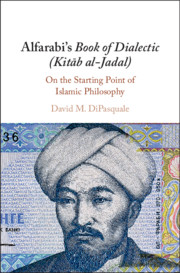Book contents
- Alfarabi’s Book of Dialectic (Kitāb al-Jadal)
- Alfarabi’s Book of Dialectic (Kitāb al-Jadal)
- Copyright page
- Dedication
- Epigraph
- Contents
- Preface
- Acknowledgments
- Introduction
- 1 Alfarabi’s Kitāb al-Jadal: A Complete English Translation
- 2 Dialectic and Political Science
- 3 Dialectic and the Principles of All Science
- 4 Dialectic and the Method of Natural and Divine Science
- 5 Dialectic and Education
- 6 Conclusion: Alfarabi and the Taxonomy of the Medieval Arabic Organon
- English–Arabic
- Arabic–English
- References
- Index
6 - Conclusion: Alfarabi and the Taxonomy of the Medieval Arabic Organon
Published online by Cambridge University Press: 11 October 2019
- Alfarabi’s Book of Dialectic (Kitāb al-Jadal)
- Alfarabi’s Book of Dialectic (Kitāb al-Jadal)
- Copyright page
- Dedication
- Epigraph
- Contents
- Preface
- Acknowledgments
- Introduction
- 1 Alfarabi’s Kitāb al-Jadal: A Complete English Translation
- 2 Dialectic and Political Science
- 3 Dialectic and the Principles of All Science
- 4 Dialectic and the Method of Natural and Divine Science
- 5 Dialectic and Education
- 6 Conclusion: Alfarabi and the Taxonomy of the Medieval Arabic Organon
- English–Arabic
- Arabic–English
- References
- Index
Summary
The dialectical art which Alfarabi outlines in the Book of Dialectic addresses the reigning confusion surrounding the context theory, which refers to the form of Aristotle’s Organon inherited by the medieval Arab philosophers from an earlier Alexandrian tradition. I argue that Alfarabi intended to recover an understanding of science, dialectic, rhetoric, sophistry and poetics that is Platonic or Socratic in nature. Instead of (like Aristotle) understanding science, dialectic, rhetoric, sophistics and poetics as separate and somewhat exclusive compartments within the greater philosophic or scientific enterprise, Alfarabi’s considered view of science precluded such a radical sort of division. The “context theory” should then be viewed as simply a modern, shorthand way of confronting the Platonic correction of the more common ordering of the arts of logos. For the philosopher as dialectician is much too cognizant of those basic prerequisites of philosophizing (to which he must constantly return) to permit him to rest satisfied with any overly technical framework that does not do justice to those conditions. I will insist that the Alfarabi that emerges here is not a typical Platonist: he is a Socratic or rather a philosopher in that sense of the term.
- Type
- Chapter
- Information
- Alfarabi's Book of Dialectic (Kitab al-Jadal)On the Starting Point of Islamic Philosophy, pp. 279 - 288Publisher: Cambridge University PressPrint publication year: 2019



